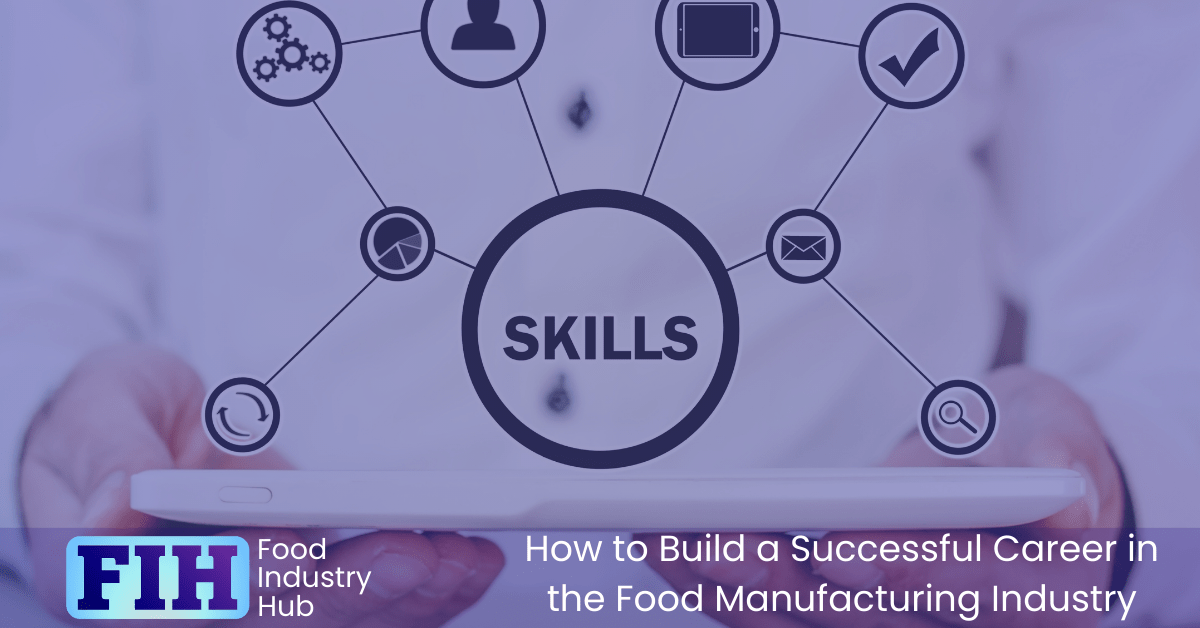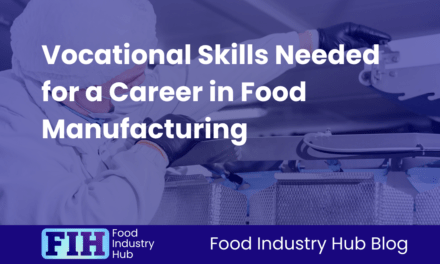Introduction
In the food manufacturing industry, you’re not just creating products, you’re part of an essential process that feeds the world. How do you navigate this complex field to not only survive, but thrive? It’s not just about knowing your way around a production line or mastering the science behind food processing. It’s about setting goals, honing your skills, and building connections. But there’s more to it. Curious to find out what that might be?
This post is part of a collection we’ve put together to explore the topic of professional success, and you can explore the topic in more detail by browsing the related content.
Table of Contents
Key Takeaways
- Define clear, measurable career goals aligned with the food manufacturing industry, and plan strategically to achieve them.
- Embrace challenges and setbacks as opportunities for growth, learning, and skill development.
- Stay updated on industry trends, participate actively in events, and engage with industry networks for opportunities and knowledge.
- Develop a range of skills, both technical and interpersonal, to enhance performance and versatility.
- Nurture passion for the field, and leverage this enthusiasm to drive continuous learning, innovation, and engagement within the industry.

Clearly define your goals and objectives
What’s your endgame in food manufacturing? Is it to own a thriving business? To create sustainable, eco-friendly products? Or perhaps you’re driven by the desire to revolutionise health-focused foods?
Whatever your aspiration, it’s crucial to clearly define your goals and objectives from the outset.
It’s not enough to say, “I want to succeed.” You’ve got to be more specific. What does success look like to you? Is it a certain sales figure? A specific number of retail outlets carrying your product? Or perhaps it’s a particular market share percentage?
Get clear on your vision and then break it down into measurable, achievable objectives.
For example, if you’re aiming for a specific sales figure, what steps do you need to take to reach it? Do you need to increase production, expand your distribution network, or improve your marketing strategy? Being clear about your professional aspirations will enable you to target your efforts so that you stand a good chance of achieving them.

Tackle challenges with a step-by-step approach
In the food manufacturing industry, you’ll inevitably face challenges.
It’s essential to tackle these hurdles with a systematic, step-by-step approach. Here’s how you can do it.
Firstly, identify the challenge. It’s impossible to solve a problem if you don’t know what it is. Whether it’s mastering a new technique, adapting to a changed process, or dealing with a difficult coworker, being clear about the issue is the first step.
Next, break down the challenge into manageable parts. If you’re learning a new technique, for example, divide it into different stages. By focusing on one stage at a time, you’ll find the process more manageable.
Then, develop a strategy for each part. You might need to do some research, seek advice, or practice a skill. Be proactive and determined in your approach.

Picture yourself achieving your goals
Often, the key to success lies in your ability to visualise your goals. This is as true in the food manufacturing industry as it’s in any other field. Picture yourself standing at the helm of a successful enterprise, navigating the complexities of your vocation with ease. This isn’t just a pipe dream; it’s a practical step towards your future success.
Visualising your goals is crucial to maintaining your drive and focus. It’s easy to lose sight of the endgame amid the daily grind. However, by consistently reminding yourself of your ultimate objectives, you’ll be more motivated to overcome the obstacles that block your path.
Now, close your eyes and imagine achieving your career goals. Feel the satisfaction of creating high-quality products that consumers love. Envision the pride of leading a team of dedicated professionals towards shared objectives.
And most importantly, picture the joy that comes from realising you’ve built a career that aligns with your passions and skills.
In essence, visualisation isn’t just about dreaming big; it’s about crafting a mental blueprint for success. So, keep your goals in clear view as you navigate your career path in food manufacturing.

Sign-up for the Food Industry Hub Mail Service
We regularly produce new content for food industry professionals, and the Food Industry Hub Mail Service is the best way to stay up to date with the latest additions.
Signup today to be added to the Food Industry Hub mailing list.
Develop tangentially relevant skills to compliment your vocational career skills
In the food industry, mastering your specific vocational skills is indeed vital, but don’t underestimate the value of tangentially relevant skills.
These are skills that aren’t directly related to your job but can significantly compliment your primary abilities. For example, you might be a wizard in recipe formulation, but how about communication? Can you articulate your ideas clearly to your team?
Or, perhaps, you’re an expert in food safety protocols, but have you considered honing your leadership skills?
These aren’t just extras. They’re essentials. They can enhance your performance, make you more versatile, and increase your value to your employer.
Think of these skills as additional tools in your career toolbox. They can make you stand out, open up new opportunities, and even make your work more enjoyable.

Ask questions and seek to understand different perspectives
Don’t be afraid to ask questions. Knowledge is power, and the more you know, the more effective you’ll be.
Whether you’re learning about food safety regulations, understanding the intricacies of supply chain management, or getting to grips with production processes, every question answered is a step towards success.
But asking questions isn’t enough. You’ve got to listen to the answers, too. Seek to understand different perspectives.
Remember, you’re part of a team, and every member has unique insights to offer. Be curious about your colleagues’ experiences, their ideas, and their concerns. Their perspectives may differ from yours, and that’s a good thing. It’s these differences that drive innovation and progress.
And don’t stop at asking your peers. Reach out to mentors, industry experts, even competitors. You never know where you might find a nugget of wisdom.

Be realistic about what will be required for you to reach your career goals
While it’s easy to dream of reaching the top, you must be realistic about what it will take to get there. The food manufacturing industry is a complex, evolving sector. It’s not enough to simply have a desire to succeed. You’ll need a solid plan, a certain set of skills, and a willingness to put in the hard work.
Consider the qualifications and experience required for your dream job. Will you need a degree or professional certification? How many years of experience are typically required? Don’t shy away from these details. Instead, embrace them as stepping stones on your path to success.
Also, understand that your career path may not be a straight line. You may need to take on roles that aren’t your ideal job, but offer valuable experience. You may face setbacks and challenges. That’s all part of the journey.
Lastly, don’t underestimate the importance of networking. Building relationships with others in the industry can open doors and provide opportunities that you mightn’t have access to otherwise.
Be realistic, be prepared, and be ready to work hard. That’s how you’ll build a successful career in the food manufacturing industry.

Nurture your passion and enthusiasm for food manufacturing
Fuelling your passion for food manufacturing is an essential element in building a successful career in this industry. It’s not merely about having a job; it’s about enjoying what you do and feeling enthusiastic about your daily tasks. Your passion becomes the driving force that propels you to exceed expectations and strive for excellence.
Understand that food manufacturing isn’t just about production lines and machinery. It’s about creating products that people enjoy and depend on. It’s about innovation, sustainability, and maintaining high standards of quality and safety.
So, how do you nurture this passion? Start by keeping up with industry trends and innovations. Read about new production techniques, emerging food technologies, and sustainability initiatives.
Attend industry events, webinars, and workshops. Get involved in community discussions.

Pay attention to your interpersonal and networking abilities
Building strong interpersonal skills can significantly boost your career in food manufacturing. It’s not just about your technical know-how or your passion for the industry. Your ability to effectively communicate, lead, and work in a team plays a crucial role in your success.
You shouldn’t underestimate the power of good relationships in the workplace. Colleagues who respect and trust you can become influential allies. They’ll support your ideas, provide you with constructive feedback, and even recommend you for promotions or new opportunities.
Don’t forget, networking isn’t limited to your current workplace. Reach out to industry professionals on platforms like LinkedIn. Attend events and seminars. Be active in online groups and forums. The more contacts you have, the more you’ll learn about the industry trends, changes, and job opportunities.
Finally, remember that building these skills is a continuous process. Keep honing your communication skills. Regularly seek feedback to understand how you’re perceived. Invest in soft skills training.
In the food manufacturing industry, people skills can be as important as technical skills. Paying attention to your interpersonal and networking abilities can be the differentiator that propels your career forward.

Take advantage of opportunities when they arise
You never know when a golden opportunity might come your way. It’s crucial to be ready, alert, and prepared to seize these chances when they arise. It might be a new job, a promotion, or a project that could catapult your career to new heights. The key to taking advantage of these opportunities is to maintain a proactive mindset.
Don’t just wait for opportunities to fall into your lap. Instead, actively seek them out. Attend industry conferences, network with professionals, participate in relevant webinars and workshops. These activities can expose you to potential opportunities you wouldn’t find otherwise.
When an opportunity does arise, evaluate it critically. Does it align with your career goals? Will it provide you with new skills or experiences? If the answer is yes, don’t hesitate. Jump in and give it your all.
Lastly, remember that not all opportunities come packaged as you’d expect. Sometimes, they’re disguised as challenges or setbacks. Embrace these situations and learn from them. They’re just as valuable in building a successful career in the food manufacturing industry.

In Summary
Building a successful career in food manufacturing isn’t just about technical skills. You’ve got to set clear goals, embrace challenges, and continuously develop your abilities. Ask questions, be realistic about your journey, and keep your passion alive. Don’t overlook the power of networking and grab opportunities when they show up. Keep up with industry trends and stay versatile. Remember, it’s your proactive approach that’ll steer you towards success.

Further Resources
Food Industry Hub serves the food industry with a range of digital resources for the benefit of both commercial food manufacturers and food industry professionals.
For food manufacturers, we offer integrated management systems that give every user a direct interface with your QMS.
For food industry professionals, we provide an extensive signposting service in addition to informational content we hope you’ll find useful as you face new professional challenges. We have very ambitious plans to expand the range of services offered, and currently present informational content on management, safety and quality, food safety and quality culture, and professional success.














